
Robert Leroy Johnson was an American blues musician and songwriter. His landmark recordings in 1936 and 1937 display a combination of singing, guitar skills, and songwriting talent that has influenced later generations of musicians. Although his recording career spanned only seven months, he is recognized as a master of the blues, particularly the Delta blues style, and one of the most influential musicians of the 20th century. The Rock and Roll Hall of Fame describes him as perhaps "the first ever rock star".
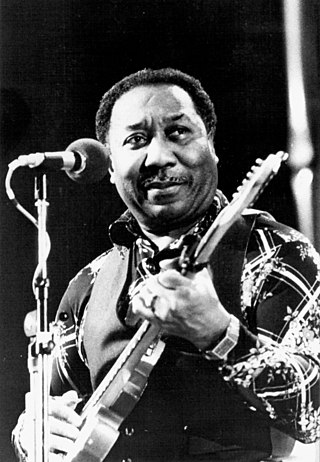
McKinley Morganfield, known professionally as Muddy Waters, was an American blues singer and musician who was an important figure in the post-World War II blues scene, and is often cited as the "father of modern Chicago blues". His style of playing has been described as "raining down Delta beatitude".

461 Ocean Boulevard is the second solo studio album by English musician Eric Clapton. It was released in late July 1974 by RSO Records, after the record company released the hit single "I Shot the Sheriff" earlier in the month. The album topped various international charts and sold more than two million copies.
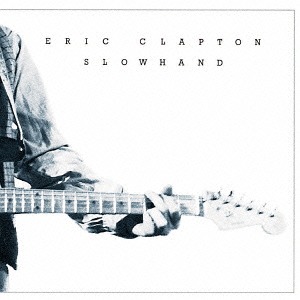
Slowhand is the fifth solo studio album by Eric Clapton. Released on 25 November 1977 by RSO Records, and titled after Clapton's nickname, it is one of his most commercially and critically successful studio albums. Slowhand produced the two hit singles "Lay Down Sally" and "Wonderful Tonight", reached various international music charts and was honoured with numerous awards and recording certifications. In 2012, a deluxe edition was released to celebrate the album's 35th anniversary.

"When the Levee Breaks" is a country blues song written and first recorded by Memphis Minnie and Kansas Joe McCoy in 1929. The lyrics reflect experiences during the upheaval caused by the Great Mississippi Flood of 1927.

Derek and the Dominos were a short-lived English–American blues rock band formed in the spring of 1970 by singer-guitarist Eric Clapton, keyboardist-singer Bobby Whitlock, bassist Carl Radle and drummer Jim Gordon. All four members had previously played together in Delaney & Bonnie and Friends, during and after Clapton's brief tenure with Blind Faith. Dave Mason supplied additional lead guitar on early studio sessions and played at their first live gig. Another participant at their first session as a band was George Harrison, the recording for whose album All Things Must Pass marked the formation of Derek and the Dominos.

Layla and Other Assorted Love Songs is the only studio album by the English–American rock band Derek and the Dominos, released on 9 November 1970 as a double album by Polydor Records and Atco Records. It is best known for its title track, "Layla", which is often regarded as Eric Clapton's greatest musical achievement. The other band members were Bobby Whitlock, Jim Gordon, and Carl Radle (bass). Duane Allman played lead and slide guitar on 11 of the 14 songs.
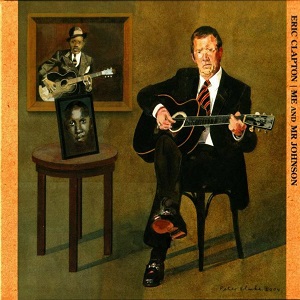
Me and Mr. Johnson is the fifteenth solo studio album recorded by Eric Clapton, released in March 2004 by Reprise Records. It consists of covers of songs written and originally recorded by Robert Johnson. The album cover was painted by Sir Peter Blake, using a series of photographs of Clapton. Clapton had planned to record an album of new material, but by the time of the recording sessions there were not enough new songs written, so the band instead recorded a series of Johnson songs.

Fun House is the second studio album by American rock band the Stooges. It was released on July 7, 1970, by Elektra Records. Though initially commercially unsuccessful, Fun House developed a strong cult following. Like its predecessor and its successor, it is generally considered integral in the development of punk rock.

"Love in Vain" is a blues song written by American musician Robert Johnson. Johnson's performance – vocal accompanied by his finger-style acoustic guitar playing – has been described as "devastatingly bleak". He recorded the song in 1937 during his last recording session and in 1939 it was issued as the last of his original 78 rpm records.
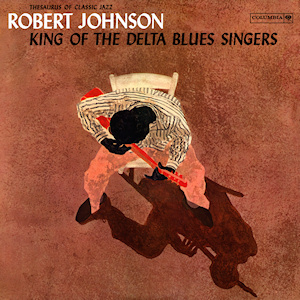
King of the Delta Blues Singers is a compilation album by American Delta blues musician Robert Johnson, released in 1961 by Columbia Records. It is considered one of the most influential blues releases. In 2020, Rolling Stone ranked it number 374 on its list of the 500 Greatest Albums of All Time.
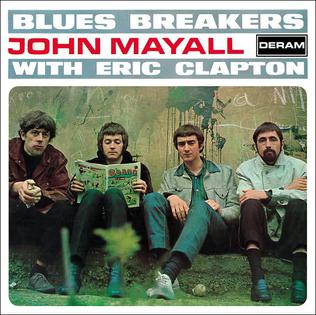
Blues Breakers, colloquially known as The Beano Album, is the debut studio album by the English blues rock band John Mayall & the Bluesbreakers, originally credited to John Mayall with Eric Clapton. Produced by Mike Vernon and released in 1966 by Decca Records (UK) and London Records (US), it pioneered a guitar-dominated blues-rock sound.

Folk Singer is the fourth studio album by Muddy Waters, released in January 1964 by Chess Records. The album features Waters on acoustic guitar, backed by Willie Dixon on string bass, Clifton James on drums, and Buddy Guy on acoustic guitar. It is Waters's only all-acoustic album. Numerous reissues of Folk Singer include bonus tracks from two subsequent sessions, in April 1964 and October 1964.
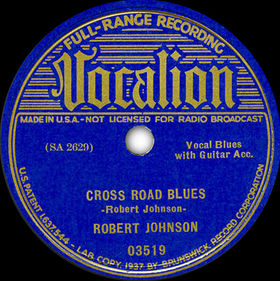
"Cross Road Blues" is a song written by the American blues artist Robert Johnson. He performed it as a solo piece with his vocal and acoustic slide guitar in the Delta blues-style. The song has become part of the Robert Johnson mythology as referring to the place where he supposedly sold his soul to the Devil in exchange for his musical talent. This is based largely on folklore of the American South that identifies a crossroads as the site where such pacts are made, although the lyrics do not contain any references to Satan or a Faustian bargain.

"Stop Breaking Down" or "Stop Breakin' Down Blues" is a Delta blues song recorded by Robert Johnson in 1937. An "upbeat boogie with a strong chorus line", the lyrics are partly based on Johnson's experience with certain women:

What's Shakin' is a compilation album released by Elektra Records in May 1966. It features the earliest studio recordings by the Lovin' Spoonful and the Paul Butterfield Blues Band, as well as the only released recordings by the ad hoc studio group Eric Clapton and the Powerhouse, until they were reissued years later.
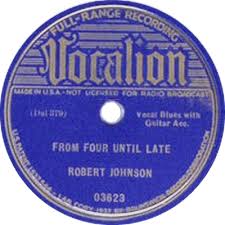
"From Four Until Late" is a blues song written by Delta blues musician Robert Johnson. He recorded it in Dallas, Texas, during his second to last session for producer Don Law on June 19, 1937. The lyrics contained his philosophical lines of "a man is like a prisoner, and he's never satisfied".

"It's Nobody's Fault but Mine" or "Nobody's Fault but Mine" is a song first recorded by gospel blues artist Blind Willie Johnson in 1927. It is a solo performance with Johnson singing and playing slide guitar. The song has been interpreted and recorded by numerous musicians in a variety of styles, including Led Zeppelin on their 1976 album Presence.

King of the Delta Blues Singers, Vol. II is a compilation album by American blues musician Robert Johnson, released in 1970 by Columbia Records. In 2003, the album was ranked number 424 on Rolling Stone magazine's list of the 500 greatest albums of all time.

American blues musician Robert Johnson (1911–1938) recorded 29 songs during his brief career. A total of 59 performances, including alternate takes, were recorded over a period of five days at two makeshift recording studios in Texas. Producers selected 25, which Vocalion Records issued on 12 two-sided 78 rpm record singles between 1937 and 1939. These went out-of-print, but were the only source of Johnson's work until his recordings were eventually issued on albums beginning in 1959. In addition to those on the original singles, another 17 recordings have been released.




















